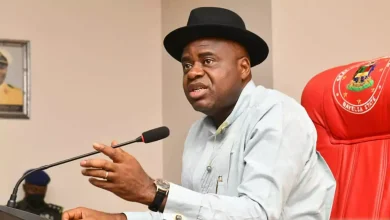Ijaw Congress rejects pardons, demands real justice for Niger Delta

The Ijaw National Congress (INC), the highest socio-cultural and political body representing the Ijaw people globally, has expressed deep reservations over the recent exercise of presidential pardons by President Bola Tinubu.
In a statement signed by its President, Professor Benjamin Okaba, and released from its national secretariat in Yenagoa,
describing the move as symbolic and ultimately inadequate in addressing the systemic injustices suffered by the Niger Delta.
While acknowledging the president’s constitutional authority to extend the prerogative of mercy to 175 Nigerians, the INC maintained that such gestures, no matter how far-reaching, failed to correct the historical and ongoing oppression of the Ijaw people and other ethnic nationalities in the oil-producing region.
The INC described the pardons as a distraction from the core issues affecting the region: environmental degradation, economic marginalization, and the denial of political self-determination.
“We are not oblivious of the serious moral issues raised by other critical stakeholders across the country and beyond, but we are more concerned by the fact that this gesture, though wide-ranging, does little to address the deep-seated, systemic, and ongoing injustices perpetrated against the Ijaw people,” the statement said.
The INC acknowledged the posthumous pardon granted to Ken Saro-Wiwa and the eight other Ogoni activists, known as the Ogoni Nine, executed by the Nigerian state in 1995.
While recognising the act as a long-overdue admission of injustice, the INC asserted that the gesture is hollow in the absence of meaningful environmental and economic reforms.
“Pardoning the dead without healing the land and empowering the living is a hollow victory,” the INC said, stressing that the environmental destruction, poverty, and political repression that Saro-Wiwa fought against remained rampant across the Niger Delta.
The organisation emphasised that true justice required not only symbolic acknowledgment but also concrete efforts to redress the harm done to communities still suffering from the legacy of exploitation and state violence.
The statement alsy condemned the economic policies and legal frameworks that continued to deprive the Ijaw people of control over their natural resources.
The INC cited the Petroleum Decree of 1969 and the Petroleum Industry Act (PIA) of 2021 as central instruments of expropriation.
According to the INC, “The Ijaw nation remains the primary source of the oil and gas wealth that fuels Nigeria’s economy, yet its people remain economically suffocated and politically marginalised.
“This is nothing short of economic asphyxiation. A presidential pardon that does not restore our dignity and right to control and manage our God-given resources is no use to us, ” the statement read.
Beyond economic concerns, the INC described the environmental damage suffered by the Ijaw people as “ecological genocide.”
It pointed to decades of unchecked oil spills, continuous gas flaring, and environmental neglect by both multinational oil corporations and the Nigerian state.
The result, the INC said, has been the destruction of farmlands, rivers, and the entire ecosystem that sustains the livelihoods of the Ijaw people.
The organisation stressed that ecological restoration is non-negotiable and must be treated as a matter of urgency.
“We do not need paternalistic gestures of mercy. We demand environmental justice, ecological restoration, and accountability from both multinational corporations and the Nigerian state, ” INC said.
The Congress therefore called on both the Nigerian government and the international community to take meaningful steps to address the longstanding challenges in the region.
Their demands include:A genuine process for resource control and fiscal federalism, allowing the Ijaw people to own and manage their natural resources as a matter of right under natural justice and international law.
Immediate enforcement of a comprehensive environmental remediation program, including full implementation of the United Nations Environment Programme (UNEP) Report on Ogoniland and extending the cleanup to other impacted communities.
Repeal of the Land Use Act and the review of constitutional provisions that sustain internal colonialism and systemic oppression.
Reform of extractive laws, especially the disparity between the Petroleum Industry Act (2021), which governs oil and gas, and the Nigerian Minerals and Mining Act (2007), which governs solid minerals.
The INC accused the government of using the PIA to militarize and exploit the Niger Delta while applying more favorable terms to other regions.
An end to political persecution of Ijaw leaders, referencing the recent impeachment attempt against Rivers State Governor Siminalayi Fubara as part of a broader pattern of political hostility toward the Ijaw nation.
The Congress affirmed its unwavering commitment to peaceful advocacy, insisting that the Ijaw people’s struggle is not for temporary relief but for lasting justice and sovereignty.
“Our right to self-determination is inalienable and rooted in solemn treaties with the British Crown, as well as principles of international law.
“We shall continue to pursue this cause through peaceful, diplomatic, and strategic means, with the full solidarity of the global community,” the statement added.



